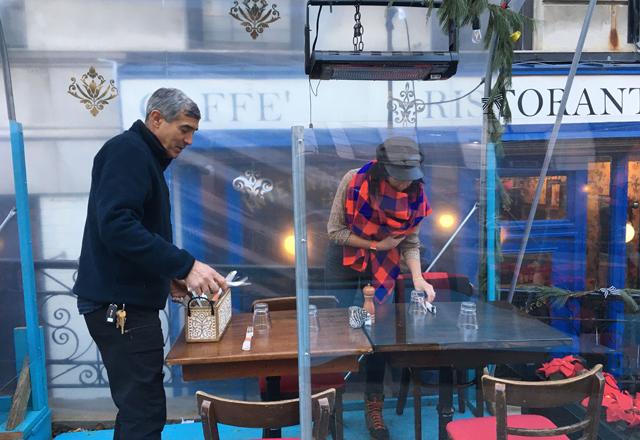You are here
Weak Sauce? US relief bill may be too skimpy for restaurants
By AFP - Dec 30,2020 - Last updated at Dec 30,2020

Pisticci restaurant and bar owners Michael and Vivian Forte set up a table outdoors in front of their establishment in New York (AFP photo)
NEW YORK — Washington's long-awaited pandemic relief package offers a lifeline to the devastated US restaurant industry, but eateries still face months of turmoil before they are clear of the coronavirus crisis.
The $900 billion bill that provides more funding for the Paycheck Protection Programme (PPP), comes too late for the estimated 110,000 restaurants that have closed their doors permanently.
Those that survived the shutdowns and restrictions on indoor dining, can borrow up to $2 million in loans that would convert to grants if at least 60 per cent is spent on payroll.
Despite some improvements from the original PPP that Congress approved in March, restaurants gave mixed reviews of the programme and some worry the funding will fall short.
Vivian Forte, who with her husband owns Pisticci in New York City, said Monday she was "exuberant" the relief bill was finally enacted. Without it she would have had to lay off the entire staff.
"Our back is completely against the wall," Forte told AFP. "None of us are making any money. We're all in this for the staff right now."
But Andrew Volk, owner of the Hunt and Alpine Club in Portland, Maine, has not decided whether to seek another PPP loan.
It "seems like a band aid", he told AFP.
"We don't know what our business is going to look like when the snow melts."
'We're just hustling'
Nine months into the pandemic, a recent survey from the National Restaurant Association shows more than one-sixth of the nation's restaurants have closed, and a majority expect continued furloughs and layoffs for at least the next three months.
Dimitri Fetokakis, owner of Niko Niko's, a small Greek restaurant chain in Houston, said the crisis has forced eateries to adapt.
"We're just hustling," he said.
When in-person dining was banned in the early days of the pandemic, Niko Niko's cut managers' salaries by 40 per cent and they joined other staff assisting with curbside pickup.
He also organised pop-up events in the suburbs, taking orders online and setting up mass-distribution sites without delivery charges.
Fetokakis said he expects to apply for a PPP for his catering business and for the downtown location that has suffered most with many people still working from home.
RayNathan's, a North Carolina barbecue restaurant, has found it difficult to adapt as business has fluctuated, especially given the time-intensive nature of good barbeque: Smoked beef brisket, for example, requires 15 hours of prep time.
"The dining public is just a lot more emotional," said co-owner Stephen Carroll of the unpredictable flows that make it difficult to know how much food to cook.
At times the restaurant has given away surplus food to food banks.
"You've either got waste, or you lose sales when you don't have enough," he said.
Carroll said he is not sure if the restaurant will apply for another PPP.
The earlier round allowed him to avert layoffs, but the original rules mandated the money be spent within eight weeks.
Political reality
Congress in June extended the deadline to use the funds to 24 weeks, but by then RayNathan's had already spent most of the money, Carroll said.
The PPP also has been a source of controversy, after huge amounts went to publicly-traded companies including Shake Shack and Ruth's Chris before the chains returned the funds, and after revelations about funds going to tenants of buildings owned by the Trump Organisation and the family of Jared Kushner, President Donald Trump's son-in-law and adviser.
Still, the programme has been credited with saving millions of jobs and again became the prime vehicle for providing government support to small businesses.
After months of grinding talks on the second round of stimulus, Congress approved $284 billion to fund PPP.
The programme is open to all industries, but includes some features specific to restaurants. It allows restaurants to receive loans up 3.5 times their monthly payroll, compared with 2.5 times for other industries. Restaurants also may deduct business expenses paid with PPP loans.
Industry leaders had been championing the $120 billion Restaurants Act, which would provide grants that can be used to pay back debt as well as low-interest, 10-year loans designed to put restaurants back on solid footing for the medium-term.
The Democratic-controlled House passed the Restaurants Act and it currently lists 52 bipartisan supporters in the Senate, a majority.
But Mike Whatley, a vice president with the National Restaurant Association, said given the $900 billion limit, the targeted bill "was just too much to get done".
But he said the PPP improvements would provide help in the interim as the industry prepares for another push in Washington next year.
Related Articles
AMMAN — The holy month of Ramadan is an opportunity for the local restaurant industry to rethink their service delivery operations that matc
WEST PALM BEACH, United States — After delaying for nearly a week and under pressure from all sides, US President Donald Trump finally signe
As Jordanian consumers are spending more on eating out, hundreds of restaurants are opening every year.


















